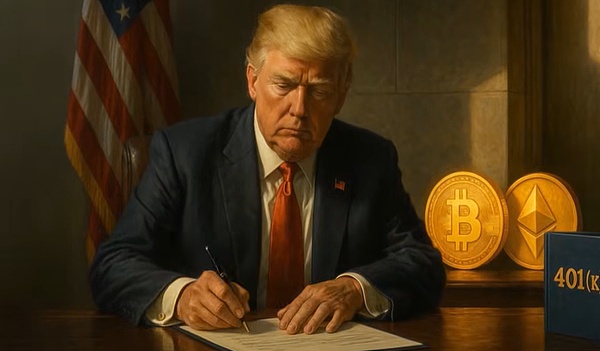President Donald Trump will sign an executive order today directing federal regulators to simplify the legal path for 401(k) plans to include private equity, real estate, cryptocurrencies, and other alternative assets.
According to Bloomberg, the directive directs the Labor Department to review fiduciary guidance under the Employee Retirement Income Security Act (ERISA) and coordinate with the SEC and Treasury Department to provide broader investment channels for defined contribution plans.
The move opens up approximately $12.5 trillion in retirement savings in the United States to potential access for asset managers that have long been restricted from retail distribution pools. While traditional 401(k) plans remain focused on publicly traded stocks and bonds, the government's directive would represent the most groundbreaking policy shift yet to bring alternative assets, including digital currencies, into mainstream retirement products. The directive continues a series of measures since early 2025 that have gradually dismantled previous regulatory barriers. In May, the Department of Labor rescinded a 2022 compliance bulletin that had warned fiduciaries not to offer cryptocurrencies in retirement products without rigorous review. The previous guidance deviated from ERISA's principles-based approach to regulation by applying stricter standards to digital assets. With the revocation of this opinion, trustees must once again evaluate all assets, including cryptocurrencies, based on a uniform prudential standard (rather than a special prudential principle). In March of this year, Trump signed an executive order establishing a strategic Bitcoin reserve and a separate national digital asset reserve pool. Subsequently, the White House hosted "Crypto Week" and ultimately signed the GENIUS Act, the first federal legislation in the United States to regulate stablecoins. The government also appointed venture capitalist David Sacks as head of cryptocurrency and AI affairs, further deepening its policy direction of promoting financial innovation through digital assets.

What does it mean to allow cryptocurrencies into 401(k) retirement plans?
Opening 401(k) plans to digital assets and private markets marks both a shift in market access and a broader conceptual restructuring. With the number of publicly traded companies down to nearly half of their 1996 peak, private equity, venture capital, and digital assets have grown into core elements of capital formation. Institutional investors such as endowments and pension funds have increased their exposure to these instruments, while retail savers remain confined to a more limited range of vehicles. Faced with allocation caps for institutional clients, asset managers see defined contribution plans as the next frontier. The latest directive echoes a move made during Trump’s first term, when the Labor Department allowed retirement plan administrators to include private equity as a diversification option without violating their fiduciary duties. That guidance was rescinded under the Biden administration and is now restored with this new measure. According to Bloomberg, legal concerns and fears of fiduciary liability previously prevented plan sponsors from offering illiquid or complex products, but the current policy aims to formalize a framework and reduce perceived compliance risks. For cryptocurrencies in particular, the directive lays the groundwork for their formal inclusion in investment portfolios, which until recently had been blocked due to regulatory opposition. Fiduciaries will still need to demonstrate compliance with ERISA's prudential principles and duty of care standards, but will no longer be restricted to specific asset classes. This impact could expose retail savers to volatile and high-fee investment vehicles, necessitating a renewed emphasis on disclosure, valuation methodologies, and custodial safeguards.
The Department of Labor said it will coordinate with the SEC and other agencies to evaluate further rulemaking.
The Department of Labor said it will coordinate with the SEC and other agencies to evaluate further rulemaking.
The SEC is expected to take steps to provide participant-directed plans with access to cryptocurrencies and private market assets.
At the same time, firms such as Blackstone, Apollo Global Management (Apollo), and KKR, which have long advocated for 401(k) funds to enter the private market, are expected to benefit from this due to their pre-emptive infrastructure and lobbying investment. Critics argue that complex assets can increase risks for savers without financial literacy, especially in the absence of strong regulation or transparent fee disclosure. But supporters argue that plan products should be determined by fiduciary decisions, not blanket exclusions, and that savers should have access to the full range of modern capital instruments. The effectiveness of the executive order will depend on upcoming implementation steps by federal agencies. For now, it sets a policy marker that reorients retirement systems toward broader exposure to private and digital asset classes, marking another step in the government's efforts to integrate cryptocurrencies into the nation's economic infrastructure.
 YouQuan
YouQuan
 YouQuan
YouQuan YouQuan
YouQuan Joy
Joy Hui Xin
Hui Xin Joy
Joy Hui Xin
Hui Xin Joy
Joy Brian
Brian Brian
Brian YouQuan
YouQuan